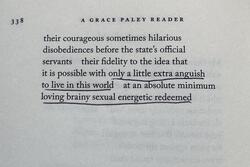Mad Men TV Club: Women of the Future
I’m sure no one will be surprised to hear that my love of Mad Men stems from its focus on the gender politics of the 1960s. (When the first episode aired, I remember watching with my husband and exclaiming, “It’s like my graduate studies come to life!”). So while I found this episode frustrating in many ways (why has Glen Bishop returned and what was that scene with Betty in the kitchen??), it was at least somewhat satisfying to see women’s growing confidence and opportunity emerge from an otherwise depressing storyline.
It’s clear that Don has lost his mojo. No one buys his lines—not the real estate agent, not his colleagues. His ability to imagine the future and put it into compelling language is absent. Asked to draft a vision statement for the firm, he draws a blank and instead tries to elicit ideas from others around him. The other guys in the office have nothing for him (Ted’s dream to “land a pharmaceutical” is as concrete and ambitious as they get). Peggy is clearer—to break the glass ceiling of the creative office, to earn some fame, to make a difference in the world. Interestingly, these are individual ambitions, not a collective vision (though, to be fair, she thought they were talking about her performance review).
Joan, too, articulates what she wants—to be able to do this job that she loves, and to find love on her terms. It’s not easy, and I am skeptical whether Richard, this cleaner-version-of-Roger, will fulfill her dream, but she’s still come a long way.
Even Melanie, the perky, tell-it-like-it-is real estate agent, has more ambition and clarity of purpose than Don.
Sally refuses to play the game with her dad, insisting that all she wants from the future is supper, but we know she wants more—to be different from her parents, first of all. It is telling that Don instructs her to write down what she wants from the future, because she might forget. He clearly has.
To me the most inspiring woman in this episode is Sally’s friend who has set her sights on the Senate. In 1970, there was one female senator; today there are 20 (still too low, but progress). We know that the women of the 1970s are heading into a time of greater opportunity and freedom—if also a lot of polyester.
But even the women suffer from isolation and dislocation in the Mad Men universe. They seem to have little in the way of friends or community, let alone a sense of sisterhood. As a historian of women and social movements, I keep wishing for some glimpse of a women’s movement. How can we have the Seventies without the “Seventies feminist”? Shouldn’t she have her moment, before Sally’s future Gen Y daughters make her an object of derision?







